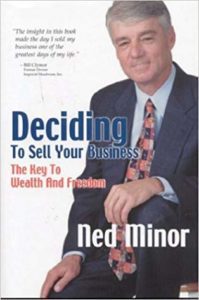“Eventually, every business owner will leave their business… either sitting down at the deal table, or feet first on a stretcher.”
Let’s face it — the idea of working until your last breath is not what gets most of us into business for ourselves. And yet, if you aren’t already planning a more graceful exit, you may end up with the one planned for you. Here’s how to pass your business along before you pass on!
Start with the End in Mind

It’s never too early to start thinking about selling your business. “The day you start building a business is the day you should start designing your exit,” Minor told me some time ago.
But Minor is a lawyer… I wanted to hear from an entrepreneur. So I talked to
Dan Freedman, then CEO of San Jose, California-based
Jasomi Networks. Dan said he sees himself not as a software entrepreneur, but as a business builder. No matter what industry he’s in or what product he makes, he says he’s always in the business of selling his business. “If you view the company itself as the product, and the acquirers as the customers, you’re on the right track,” he says.
“When you are starting or growing a company, it is always a huge amount of work,” Freedman added. “The only question is, ‘Are you going to get a huge return, an OK return, or a horrible return?’ Each outcome is possible from the same company.”
That quote was from 2004 when Freedman’s company grabbed a 40% market share and had revenue in the low 8-digits. Less than a year later, Jasomi was sold for nearly $25 million. I’m guessing that he got a huge return on that one!
Sell the Future
What does a salable company look like? “It’s salable if it’s scalable,” says Minor. Of course there are small-and-steady businesses sold everyday, but the big bucks come looking for a business that has huge growth potential.
“Every buyer thinks he’s smarter than the seller—that he can double the size of the business,” laughs Minor. “And we encourage him to think that.” A business will fetch the best price only when buyers believe they can take advantage of significant future growth potential.
Selling a company’s future upside means proving your previous growth and validating your future growth strategy. Start with two years of audited financials to show historical growth. Then be prepared to explain your business strategy and how it fits into the overall market.
And like any sale, getting into the head of the buyer is key. Big companies sometimes need to act quickly in the face of market pressures or trends. “I’ve seen companies bought for many millions of dollars just to justify a press release… or to backfill for a previous press release that left an unfulfilled promise,” Minor told me.
Have a Plan B
Why settle for just one buyer when you could have two? For Freedman, having a Plan B is a vital step in the sale process. “The stronger Plan B you can put together, the stronger your Plan A will become,” he says.
Having a strong and visible alternative makes any acquirer sit up and take notice. “There needs to be tension to the deal. Each side wants the other to think that they are about to walk away—it’s the tension that gets the deal closed.”
The best buyers are public companies. Large, high-flying public companies with broad strategic agendas and cash to spare make ideal buyers.
Selling to a public company has other tangible benefits. Since many sales transactions will leave the seller with a fist full of stock—or worse, a long-term payout—a publicly traded acquirer makes an eventual cash payout more assured.
Diligence and Disclosure
The sale of a business can be as complex as the business itself.
If the business has 10 years of operating history, then it has 10 years of potential liabilities, law suits and bad
accounting. Even for a relatively simple business, buyers will want to know exactly where the business stands. That means the seller will have to disclose copious amounts of documentation and a strict personal guarantee, called a warrant or representation, that all disclosures are complete and accurate.
If there’s any hair on the deal—any red flags—it’s going to come out. So you’re best disclosing everything up front. The quickest way to unravel a deal is to leave a buyer feeling duped.
The amount of disclosure buyers will require can be mind-boggling. Putting it all together in a reasonable fashion is just one reason to consider hiring outside help. An intermediary, such as a business broker or investment banker, can relieve you of some of the work, while also keeping the buyer engaged.
“We always recommend that a third party intermediary represent you,” says Minor. “Even if a large competitor makes you a direct offer, I’d still bring in an intermediary who can drive the valuation up.”
The seller’s dream team of advisors should probably include an investment banker, a CPA and a battle-hardened transaction attorney. A good transaction lawyer will help you get the deal done, while more conservative corporate attorneys may get bogged down in the negotiations and end up killing the deal.
Selling a business is not something you do every day, and may well be the most important transaction of your life. It’s vitally important to use professionals who will push to get the deal done while looking out for your best interests.
Go for the Gold

Remember, no deal is a sure thing until it’s done. Perhaps the only sure thing is that selling a business is never simple. Selling out can be the most harrowing and most rewarding experience in the life of an entrepreneur. Take it slowly. With careful planning, strategy and guidance, each step can add value to the company and get you closer to crossing the finish line.
Dedicated to your profits,
David Worrell
______________________
Fuse Financial Partners is here to help you take action on these and many other important business initiatives. Watch our video for a brief understanding of all the ways FUSE can help your business find that spark!
Ready to talk? Sign up to have a conversation about your business’ potential, with one of our experienced CFO-level advisors.

 It’s never too early to start thinking about selling your business. “The day you start building a business is the day you should start designing your exit,” Minor told me some time ago.
It’s never too early to start thinking about selling your business. “The day you start building a business is the day you should start designing your exit,” Minor told me some time ago. Remember, no deal is a sure thing until it’s done. Perhaps the only sure thing is that selling a business is never simple. Selling out can be the most harrowing and most rewarding experience in the life of an entrepreneur. Take it slowly. With careful planning, strategy and guidance, each step can add value to the company and get you closer to crossing the finish line.
Remember, no deal is a sure thing until it’s done. Perhaps the only sure thing is that selling a business is never simple. Selling out can be the most harrowing and most rewarding experience in the life of an entrepreneur. Take it slowly. With careful planning, strategy and guidance, each step can add value to the company and get you closer to crossing the finish line.